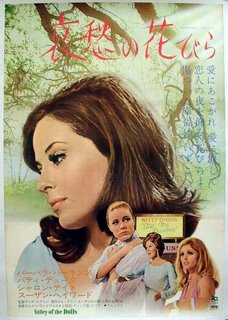Decade(nce)

Okay. So 20th Century Fox just put out suped up DVD versions of both Valley and Beyond Valley Of The Dolls, but why now? I mean, don't get me wrong, I LOVE both films (well, let's say rather that I admire Beyond). But why on God's green earth would Fox venture to suggest that they are both "Cinema Classics." You talk to any snob-nosed Film advocate and they will tell you what trash the films are. They don't get that goodness and badness are completely beyond the point. Completely.
So, on the one hand, the extra features on both DVDs would have you accept (appreciate) both features as high Camp (with some very flimsy and catered definitions of the word, I might add). It joins the ranks of the other "Cinema Masters Collection" which seem to be nothing but Beach romps - one even stars good old (or young, at the time) Joan Collins. Classics? Yet treat them like classics they did. Adorned with slipcases and brightly colored clamshells, these double disc sets even include Lobby Card reproductions kept in ever so tasteful envelopes from 20th Century Fox. It almost makes up for the fact that they took so damn long to come out with the damned things in the first place!
 But what of the film? How does it hold up, function, live now? Well, for one thing, this is one great time capsule. If nothing else (and I'm really only going to talk about Valley, here. Sorry Beyond fans, it's just better.) the film serves as an all too apt expose of the sixties. Cast to play 1960 - 1967 is Peyton Place (the TV show, not the movie) star Barbara Parkins who is thrown into the swinging sixties of Miss Sharon Tate, who, as we all to well know will forever endow a more sinister charge given that whole multiple homicide thing. Patty Duke is the girl who gets caught in between (NEELY O'HARA!!!). Hot off the tails of 'The Patty Duke Show,' Duke is innocence and naivete colliding with decadence and proclivities. Allow this to serve as your narrative. Forget the story. Jacqueline Suzanne's trash tome is not really a story - even less when you distill it for the screen. Instead it is a half-assed attempt at piecing together life experience and attempting to fabricate some filler scenes with a brain which could hardly come up with a single poetic analogy, no matter how many of the red pills it is clouded by.
But what of the film? How does it hold up, function, live now? Well, for one thing, this is one great time capsule. If nothing else (and I'm really only going to talk about Valley, here. Sorry Beyond fans, it's just better.) the film serves as an all too apt expose of the sixties. Cast to play 1960 - 1967 is Peyton Place (the TV show, not the movie) star Barbara Parkins who is thrown into the swinging sixties of Miss Sharon Tate, who, as we all to well know will forever endow a more sinister charge given that whole multiple homicide thing. Patty Duke is the girl who gets caught in between (NEELY O'HARA!!!). Hot off the tails of 'The Patty Duke Show,' Duke is innocence and naivete colliding with decadence and proclivities. Allow this to serve as your narrative. Forget the story. Jacqueline Suzanne's trash tome is not really a story - even less when you distill it for the screen. Instead it is a half-assed attempt at piecing together life experience and attempting to fabricate some filler scenes with a brain which could hardly come up with a single poetic analogy, no matter how many of the red pills it is clouded by.
 So, if we look at Valley more as a trashy histrionic, some wonders may be gleaned, but forfeit of all critical quandaries is, at times, essential for getting swept up in the rapturous inanity of the film. Cause it functions, as any good Women's film does, through its ability to evoke estrogen charged empathy. Take Dionne Warwick's practically illiterate Greek Chorus theme song which weaves its way through the film like a tapestry (call that simile a Suzanne homage). Once we get to the bottom of our emotionally charged string of adverbs (in a sentence which she almost never seems to complete: "When will I... how will I... where will I...") it hardly matters. Since this is a women's film, we must enter with our hearts on our sleeves. The first tear at the first "How" and you're good to go. Swoon. That's how you get through Valley.
So, if we look at Valley more as a trashy histrionic, some wonders may be gleaned, but forfeit of all critical quandaries is, at times, essential for getting swept up in the rapturous inanity of the film. Cause it functions, as any good Women's film does, through its ability to evoke estrogen charged empathy. Take Dionne Warwick's practically illiterate Greek Chorus theme song which weaves its way through the film like a tapestry (call that simile a Suzanne homage). Once we get to the bottom of our emotionally charged string of adverbs (in a sentence which she almost never seems to complete: "When will I... how will I... where will I...") it hardly matters. Since this is a women's film, we must enter with our hearts on our sleeves. The first tear at the first "How" and you're good to go. Swoon. That's how you get through Valley.
Now, by none of this do I seek to insinuate that the acting is good or the direction tight. The scenario is a tad too long, yes, but forgive it its short comings. There are so few of these big budget, big screen atrocities that entertain. Something like a 60's Showgirls, Valley is a heartfelt piece of nostalgic trash that deserves its place with the best of them simply because the film is a terrific feat. It covers so much leeway, so much drama, so many taboos. It is the film which both launched Tate's short lived career and sank Duke's (NEELY O'HARA!!!!!). It is essentially the last great performance by one of Hollywood's strongest leading ladies (Miss Susan Hayward) before her premature death (cancer). It is shmaltz as we could never again dream of shmaltz. It's got the sizzle and, however colorfully masked, the steak. As it may not seem to striking for the time but most of the ground covered in the film was exceptionally taboo for the time. Of course all of that would go out the window in the years which followed, but look to Valley to find the moment which left these conservative mores in its decadent dust. Perhaps that's why it has come back to us now. Applaud we should.

0 Comments:
Post a Comment
<< Home